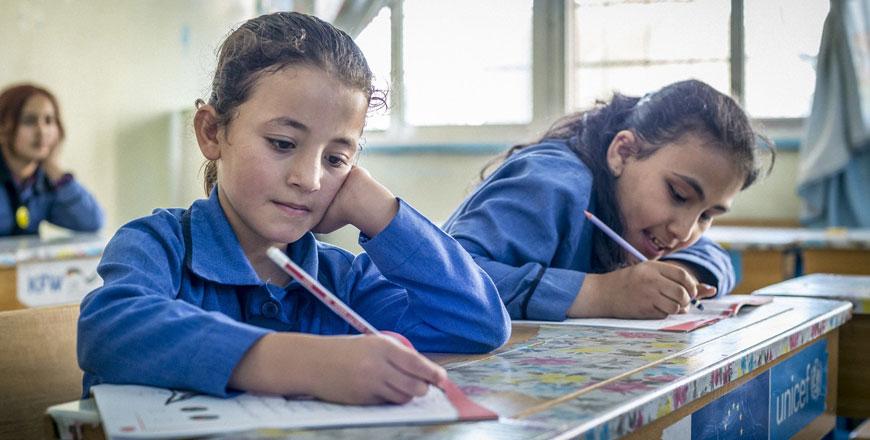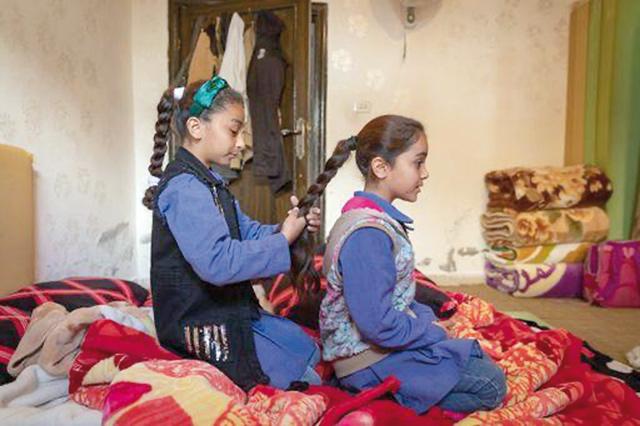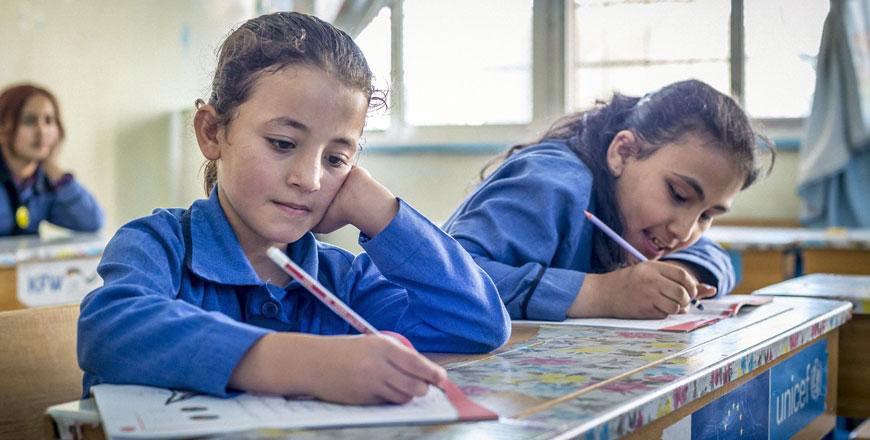You are here
UNICEF programme helps keep over 4,000 students in school but faces budget cuts
By Ana V. Ibáñez Prieto - Sep 06,2018 - Last updated at Sep 06,2018

4,000 out-of-school Syrian and Jordanian children have returned to the formal education system over the past scholastic year through UNICEF'S Hajati programme (Photo courtesy of UNICEF)
AMMAN — Over 4,000 out-of-school Syrian and Jordanian children returned to the formal education system over the past scholastic year through UNICEF’S Hajati programme (”My Needs” in Arabic), according to a report recently issued by the UN agency.
Established in September of last year, the Hajati programme integrated UNICEF’s previous child cash grant programme within a larger package of social protection services with the aim of assisting more than 55,000 refugee and vulnerable children across 205 Double Shift Schools (DSS), providing their households with a monthly cash transfer of JD20 per child towards educational purposes.
In the initial stages of the programme, the prospect of receiving cash assistance every month brought a total of 3,241 previously out of school children back to school at the beginning of the scholastic year, in addition to 1,190 children who returned to the formal education system through the rest of the year, according to UNICEF’s report.
“24 per cent of the out-of-school children eligible for the programme enrolled back to school,” the UN agency celebrated in its post distribution report, noting “that another 1,193 children were prevented from dropping out, while 3,573 beneficiaries were prevented from falling into poverty”.
As part of the programme’s advocacy activities to encourage school attendance, families at the largest risk of dropout benefitted from the “Plus” components of the programme, which resulted in visits to over 1,000 households in order to determine what additional support children needed to continue attending schools.
Independent research based on data collected through the Ministry of Education showed that, on average, the Hajati programme reduced school absences by 11.4 per cent with respect to non-beneficiaries, according to UNICEF.
But despite the success of the programme’s first year, current budget projections by the UN agency estimate that no more than 10,000 children could be covered by Hajati next school year.
“Due to funding shortfalls, UNICEF has been forced to leave out 45,000 of the most vulnerable Syrian refugee children in Jordan out of the Hajati programme in the new school year,” UNICEF Jordan communication specialist, Miraj Pradhan told The Jordan Times, warning that many of the children will be forced to drop out of school.
“This drastic reduction would have an extremely serious impact on the most vulnerable children of the Kingdom, as households would likely prioritise basic needs such as food and housing over education for their children, thus significantly decreasing the opportunity and benefit of education for the most vulnerable children in Jordan,” UNICEF warned in the report.
At least 6,356 vulnerable children would no longer be enrolled in school, 3,573 children would fall into poverty, and 8,388 vulnerable households would adopt at least one negative coping mechanism, according to the report’s estimations.
“While Makani centres do provide many of the children learning opportunities, it is not a long-term substitute for formal education, [and] for them to have an opportunity to pursue higher education and rebuild their lives.” Pradhan said, warning that “if not assisted, this generation of Syrian refugee children will be lost forever to poverty, sickness and exploitation, and will never have the skills and opportunities to achieve their full potential and live a dignified life”.
“Education is critical for Syrian refugee children to have a fair chance to pursue a life with less poverty, better health and an increased ability to take their future into their own hands, and rebuild Syria when peace returns,” he stressed.
UNICEF will continue to support 10,000 Syrian refugee children for education through the Hajati programme in the 2018-2019 academic year according to Pradhan, who noted that despite the funding challenges, the UN agency will continue to work with donors, the Government of Jordan and other partners to “deliver essential services in a cost-effective and sustainable way, while supporting the strengthening of national systems for the benefit of all vulnerable children in Jordan, irrespective of their nationality or status”.
Related Articles
AMMAN — UNICEF’s cash transfer programme has played a key role in helping children access education, suggests a new study released recently
AMMAN — UNICEF has said that its cash assistance programme “Hajati” has proven to be effective at keeping the most vulnerable children in Jo
AMMAN — UNICEF Jordan will reduce the scale and scope of several of its education programmes for Syrian refugee children due to insufficient



















